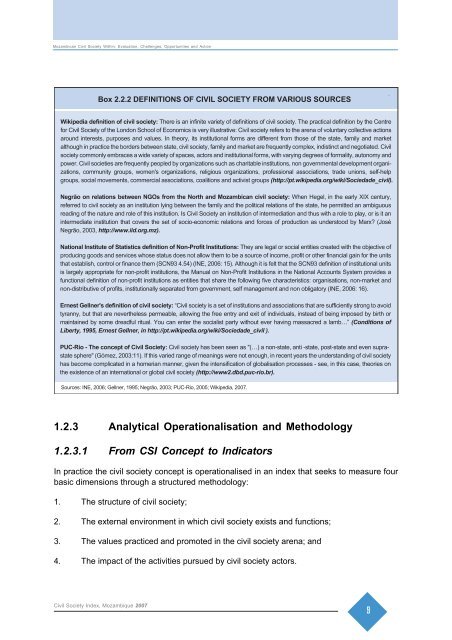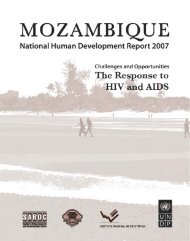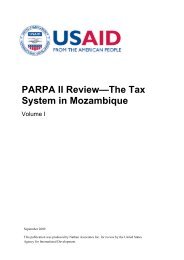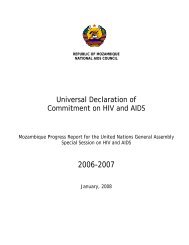Mozambican Civil Society Within: - UNICEF Mozambique - Home page
Mozambican Civil Society Within: - UNICEF Mozambique - Home page
Mozambican Civil Society Within: - UNICEF Mozambique - Home page
Create successful ePaper yourself
Turn your PDF publications into a flip-book with our unique Google optimized e-Paper software.
<strong>Mozambican</strong> <strong>Civil</strong> <strong>Society</strong> <strong>Within</strong>: Evaluation, Challenges, Opportunities and Action<br />
Box 2.2.2 DEFINITIONS OF CIVIL SOCIETY FROM VARIOUS SOURCES<br />
Wikipedia definition of civil society: There is an infinite variety of definitions of civil society. The practical definition by the Centre<br />
for <strong>Civil</strong> <strong>Society</strong> of the London School of Economics is very illustrative: <strong>Civil</strong> society refers to the arena of voluntary collective actions<br />
around interests, purposes and values. In theory, its institutional forms are different from those of the state, family and market<br />
although in practice the borders between state, civil society, family and market are frequently complex, indistinct and negotiated. <strong>Civil</strong><br />
society commonly embraces a wide variety of spaces, actors and institutional forms, with varying degrees of formality, autonomy and<br />
power. <strong>Civil</strong> societies are frequently peopled by organizations such as charitable institutions, non governmental development organizations,<br />
community groups, women's organizations, religious organizations, professional associations, trade unions, self-help<br />
groups, social movements, commercial associations, coalitions and activist groups (http://pt.wikipedia.org/wiki/Sociedade_civil).<br />
Negrão on relations between NGOs from the North and <strong>Mozambican</strong> civil society: When Hegel, in the early XIX century,<br />
referred to civil society as an institution lying between the family and the political relations of the state, he permitted an ambiguous<br />
reading of the nature and role of this institution. Is <strong>Civil</strong> <strong>Society</strong> an institution of intermediation and thus with a role to play, or is it an<br />
intermediate institution that covers the set of socio-economic relations and forces of production as understood by Marx? (José<br />
Negrão, 2003, http://www.iid.org.mz).<br />
National Institute of Statistics definition of Non-Profit Institutions: They are legal or social entities created with the objective of<br />
producing goods and services whose status does not allow them to be a source of income, profit or other financial gain for the units<br />
that establish, control or finance them (SCN93 4.54) (INE, 2006: 15). Although it is felt that the SCN93 definition of institutional units<br />
is largely appropriate for non-profit institutions, the Manual on Non-Profit Institutions in the National Accounts System provides a<br />
functional definition of non-profit institutions as entities that share the following five characteristics: organisations, non-market and<br />
non-distributive of profits, institutionally separated from government, self management and non obligatory (INE, 2006: 16).<br />
Ernest Gellner's definition of civil society: “<strong>Civil</strong> society is a set of institutions and associations that are sufficiently strong to avoid<br />
tyranny, but that are nevertheless permeable, allowing the free entry and exit of individuals, instead of being imposed by birth or<br />
maintained by some dreadful ritual. You can enter the socialist party without ever having massacred a lamb…” (Conditions of<br />
Liberty, 1995, Ernest Gellner, in http://pt.wikipedia.org/wiki/Sociedade_civil ).<br />
PUC-Rio - The concept of <strong>Civil</strong> <strong>Society</strong>: <strong>Civil</strong> society has been seen as "(…) a non-state, anti -state, post-state and even suprastate<br />
sphere" (Gómez, 2003:11). If this varied range of meanings were not enough, in recent years the understanding of civil society<br />
has become complicated in a homerian manner, given the intensification of globalisation processes - see, in this case, theories on<br />
the existence of an international or global civil society (http://www2.dbd.puc-rio.br).<br />
Sources: INE, 2006; Gellner, 1995; Negrão, 2003; PUC-Rio, 2005; Wikipedia, 2007.<br />
1.2.3 Analytical Operationalisation and Methodology<br />
1.2.3.1 From CSI Concept to Indicators<br />
In practice the civil society concept is operationalised in an index that seeks to measure four<br />
basic dimensions through a structured methodology:<br />
1. The structure of civil society;<br />
2. The external environment in which civil society exists and functions;<br />
3. The values practiced and promoted in the civil society arena; and<br />
4. The impact of the activities pursued by civil society actors.<br />
<strong>Civil</strong> <strong>Society</strong> Index, <strong>Mozambique</strong> 2007<br />
9
















